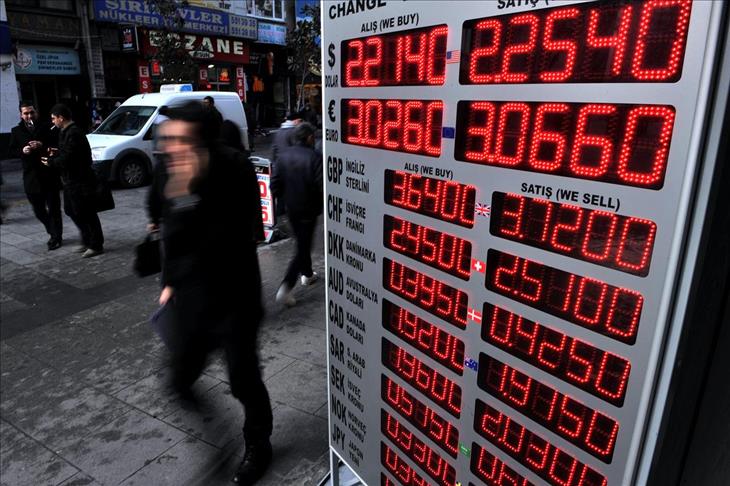
by Andrew Jay Rosenbaum and Fatih Erkan Dogan
ANKARA
The Turkish lira is set to stay its course despite global economic headwinds, analysts told Anadolu Agency on Friday.
“It now seems clear that Turkey will not see a ‘tapering’ crisis of the type experienced in 2014 this year,” commented Paul Fage, Senior Emerging Markets Strategist at TD Securities in London.
“We are not afraid of the Fed’s rate hike, whether it comes in September or in December,” agreed Bora Tamer Yilmaz, an economist with Ziraat Securities in Istanbul.
Although the Turkish currency has fallen to 2.78 against the dollar on Friday, analysts see the lira slipping moderately against the dollar and the euro by yearend, falling no further than less than three to the dollar, and perhaps 3.10 against the single currency.
“For the moment, the lira is being pressured lower by the political situation in Turkey, as parties seek to form a coalition government,” explained Christopher Dembik, an economist with Saxo Bank in Paris.
“But the Turkish economy is solid, and stable, with growth expected to improve before yearend. As a result, there is little likelihood of a flight from the currency,” he added.
The lower value of the lira will only help Turkish exports, and spur economic improvement in Turkey, Dembik also suggested.
Markets prepared for Fed rate hike
On Wednesday, the minutes of the July meeting of the U.S. central bank’s Federal Open Market Committee gave a strong indication that a rate hike could come soon. This has pushed the dollar higher against most currencies.
“But traders have already built the Fed rate hike into their pricing,” Yilmaz pointed out. “Under this assumption, we see the lira at 2.66 against the dollar. Take into account that, in trade-weighted terms, the lira is at about its cheapest possible level.”
Yilmaz forecasts a sharp reversal for the lira after this point. “Adjustment due to external deficit for the lira is complete and we are getting closer to a reversal,” he predicts.
Fage noted that all emerging-market currencies have been under pressure for the past few months, as pressure from the eventual Fed rate rise builds.
“But the lira has been underperforming in this environment. Fundamentals indicate that the Turkish lira should fall moderately, but not drastically irrespective of whatever the Fed does,” Fage said.
One factor that does weigh on the lira is the large current-account balance that Turkey maintains, according to William Jackson, Senior Emerging Markets Economist at Capital Economics in London. That, combined with the high level of foreign-currency debt, makes the lira vulnerable to a fresh bout of weakness, Jackson warned.
Politics and security
Politics and security are the two factors driving the lira lower in recent weeks, analysts agreed. Turkey is between governments, as parties seek to form a coalition, and the country is now locked in conflict with both Daesh and the Kurdistan Workers’ Party (PKK).
Turbulence of that level would put pressure on any emerging market currency, Yilmaz said, adding: “Currently, both political and geopolitical developments have increased the risk premium, and that is the main driver,” he said.
“Recent political developments are playing the most important role in lira pricing at the moment,” Fage concurred. “Fundamentals can be expected to take over once the political risk is reduced, and the security issues are controlled,” he added.
Elephant in the room
The one factor affecting the lira that is difficult to predict, analysts said, is the behavior of the central bank: Will it raise or reduce interest rates?
The central bank’s inflation report released on Thursday is difficult to interpret, analysts suggested.
In the report, the bank noted relatively slower growth for the Turkish economy, but stated an intention to maintain “cautious monetary policy”.
Turkish Central Bank Governor Erdem Basci outlined a potential move to a “simpler” policy approach based on a single benchmark interest rate. But, for now, the bank is sticking to the ‘corridor’ approach, using the higher overnight rate of 10.75 percent and the lower 7.50 percent repo rate jointly.
Rather than raising or lowering rates, the bank is reducing or increasing the amount of money available to banks under the higher or lower rate depending on the degree of tightening of the money supply it wishes to impose.
The move to a single rate would suggest a more powerful means to tighten policy, and, with inflation not yet under control, tighter policy should be expected, Jackson pointed out.
“All told, we expect market interest rates to rise by around 100 to 150 basis points by early next year,” Jackson forecast. This could push the lira higher against the dollar, and strongly counter any headwinds caused by the Fed, Turkish politics or security issues, he added.
Anadolu Agency website contains only a portion of the news stories offered to subscribers in the AA News Broadcasting System (HAS), and in summarized form. Please contact us for subscription options.

